#but a lot of people said its more like content bloat than anything meaningful?
Explore tagged Tumblr posts
Text
Does anyone else wonder what it would be like if other characters had extended optional sections/dungeons in the World of Ruin? Cyan has the Dreamscape, Strago has Ebot's Rock, and Shadow has the Coliseum. Even after characters like Cyan and Locke get plenty of relevance and depth in the World of Ruin (I especially appreciate Cyan's relapse into grief and how he struggles with an unhealthy coping mechanism and projecting onto others), they have further resolutions that you can seek out. I just wonder what it would be like for other characters? There are plenty of optional moments like with Sabin and Duncan or Terra's additional dialogue in the Ancient Castle (the story of which might I add has some interesting parallels to Terra, Locke, and Celes, and maybe I'll write about it later) or Gau meeting his father, but if only there had been more cartridge space and production time to create specialized areas to finalize each character's story after re-recruiting them. It would be especially nice for the side characters who have little relevance to the main story. A dungeon for Mog where you learn what happened to all the other moogles (the Moogle Cave is seemingly intact---though who can say what with reusing assets and all---so what happened to them?), but maybe the location is very small and cramped and you can only bring small (Mog, Relm, maybe Strago) or Imped characters. Or a snowy labyrinth for Umaro with various Undead enemies (bone sculptures come to life?), maybe similar to the Fanatics' Tower (where Umaro is decently useful) where consistent physical attacks are their biggest vulnerability. Maybe Umaro could have some dialogue about art if you take him to Owzer's Mansion. Maybe Master Duncan requires Sabin endure a lengthy trial or maybe just a fun boss fight before he learns his ultimate Blitz technique.
I really liked what the Advance version did with the Dragons' Den and how you can find each characters' ultimate weapon there. But I'm not sure if the more dungeons idea would work in a modern game, say a remake, because it's a slow and archaic method of gameplay and storytelling (but it's my personal taste and I like it, lol). Though a winding maze filled with puzzles and constant random encounters might feel painful and sluggish today, that *was* the gameplay back then, so those are the mechanics I'm thinking in. Anyway, just a little yearning for more FF6 in my life! If anyone's made anything like this or does in the future, let me know!
#ffvi#final fantasy vi#ff6#final fantasy 6#i know theres some ff6 romhack out there that adds a toooooon more content to the game#but a lot of people said its more like content bloat than anything meaningful?#so im unsure if ill check it out myself
15 notes
·
View notes
Note
I use crutches, and if my friend who was, say, a dedicated runner had a leg injury and was stuck on crutches, causing them to lose the thing that brought them joy and fulfillment, and they said "My life is a waste", I wouldn't make it about me. They have their own situation. If I complain because being cut off from the things that bring ME joy and fulfillment are cut off and my life feels empty and wasted, that's not about anyone else.
I differ with you on the ingestion and interpretation of this human experience, but I also do think your defensive response and repeated mind-reading assumptions is a symptom of you not coping well, so I’m going to ask that after this response of mine, you disengage for both your health and mine. I’m dealing with a colitis flare up, my ass has been bleeding for days, I’m in pain, I’m bloated in a backbrace, I’m super anemic right now, and there are frankly more important things I have to take care of than correcting anon assumptions more than twice (like making content for the sole purpose of helping people--non-disabled as well--with learning how to cope).
Failure to honor this boundary I’ve set will result in insta-blocking (this goes for any other anons like this, so be careful). I don’t need an apology or anything either, so please just save both our energy and don’t send another ask. Here is where I differ: It’s not “making it about me” when the belief that disabled lives are “wastes”/burdens/have less value because they can’t always be productive in the way that society views as meaningful has a body count around the world.
You can point out blind spots while still being supportive. It’s okay to point out blind spots. Friends should point out blind spots. Activists should point out blind spots. When someone’s complaint about lockdown and how it’s made them feel about themselves gets shared all over Twitter, it’s unfortunately removed from its original context which was the user saying “this is JUST MY FEELINGS and not reflective of HOW I FEEL ABOUT OTHER PEOPLE”--and as a result, after many shares, you start to see the disconnect, and you unfortunately realize something sad when you read the comments: Disabled people are told “stop feeling sorry for yourself, stop letting what you can’t do define you, etc” for the same reason (ableism, capitalism, other things likely) these people feel worthless because 2020 forced them to stop doing everything that brought them joy and meaning in a life that demands so much resilience from us already. It’s an unhealthy way of thinking no matter who it comes from.
Lots of my non-disabled friends have reached out to me this year, asking, “how do you do it?” because they are barely holding it together having to be isolated. They’ve expressed to me that they feel like their lives are wastes, and that they know I went through it to the extreme upon sudden adulthood disability, so they feel silly even feeling that way after going through barely what I went through. And your assumption is that I just snap at them? Or something? Because I agree with a post that is critical of all the people saying things they don’t realize are casually ableist and super unhealthy?
Instead of telling them what I tell every person who reaches out in private or public for help with dealing with something difficult: It’s not a contest. You are feeling this for the first time and it’s intense and you’re allowed to feel that. Nothing about the way you are feeling is wrong. Please be kind to yourself and give yourself the space to process it all. Please hang in there and please reach out. It’s possible to have compassion for what they are struggling with while also being like “Yikes, I don’t know if people realize they sound like they’re saying an unproductive life is not worth living. That’s dangerous and we should address it.”
23 notes
·
View notes
Text
Connections Review Part 3
Storm Maverick- Category 5
And we return! This will be the final part of the Connections Arc. I had initial plans for this to be 2 parts but sadly Maverick got too big and therefore he required his own part. This is by far the most divisive part of the Arc as everyone seems to be content with the time travel and harems, but as soon as Maverick ‘Motherfucker Hellspawn’ Storm got relevant it all went downhill for some. So, what do I think?
So, this is part is less ‘What is Maverick doing’ and more of what I think of Maverick. As you guys know, I am aware that Maverick is a lot older than people seem to recognize as he has his origins in Askthedespairkids. And in the context of that blog, Maverick is actually a pretty good character. You have to remember that the blog was saturated with OCs and a lot of them suffered from severe sueness or edgy syndrome. I will not make names and I will not say who made the worst OCs because that’s the easiest way to start an internet war, but the two big reasons I got bored of Askthedespairkids and quit reading is due to how poorly written a lot of these OCs were and they hogged a lot of the spotlight, and the canon characters ended up being regulated to the side-lines, which didn’t tickle my fancy at all. True, Maverick was very over the top and what he ultimately ended up doing to his former classmates in Class 75 is incredibly graphic and probably worse than some of the executions and murders canonically, but I would rather blame the general OPness of that blog. Now this is on the Mod’s terms Maverick can hopefully be hit with the nerf hammer a bit more so he isn’t as ridiculous as he was in Askthedespairkids. Furthermore, you can’t call Maverick a Villain Sue and not apply that to Junko Enoshima, because yeah, she is a Villain Sue, that’s why I don’t like her.
But things are different now. Maverick is standing on his own, against only a couple of other OCs and canon characters. Furthermore, the Mod’s writing skills have improved since the Askthedespairkids days so there’s a bit more pressure on Maverick. I think there are two issues I find with Maverick. The first is that I didn’t like him making a move during this arc. The arc was fine just focusing on time travel and the various harems and relationships of the characters, adding Storm just bloated the arc and made it much longer then needed, I feel like Maverick could have been revealed next arc and the next next arc would be the next arc we are currently getting into. This gives me serious Oncoming Storm vibes where an Arc is ridiculously long and a build up to a (hopefully) big payload. Now let me make this straight, this Arc is a million times better then Oncoming Storm, I don’t think any future Arc would be as bad as Oncoming Storm, as that was long and boring whereas the previous stuff was interesting, its just that adding Storm made the Arc very bloated and artificially extended the length of the arc making it tedious. Perhaps a forewarning to the Mod when they decide to include someone like Mikado and Junko into the story. The second issue with Maverick is…he’s basically a poor man’s Junko. At the moment I’m really struggling to find any meaningful differences between Maverick and Junko. With Juu being around we already have our big bad villain for the second Session and if I’m right, Session 3’s main villain is going to be Mikado and Session 4’s villain is Junko. I know Maverick is important to the backstories of Umeko and Kyoji, especially Kyoji, but aside from tying up those loose ends, what is the point of Maverick? Does he exist to give the Quantum Crew a practise run against Junko? And yes, his threat level is higher as he’s kidnapping an obscene amount of people and is able to block us Anons, but Maverick shouldn’t know we exist. I really, REALLLLY hope there’s a logical explanation for that because if Maverick is somehow able to sense the Anons and see how much of a threat we are, then the accusations of Maverick being a Villain Sue do hold water.
Overall, I will be more critical of Maverick now then I was back then because he enjoyed being next to poorly written characters but that safety net no longer exists and there’s too many glaring similarities between him and Junko. Now for his actions yeahhh…. I did warn you guys that Maverick is that special kind of evil but I don’t think it was until Nikei revealed about all his foster families committing suicide that it really hammered home. It’s basically vindication of what I said before. The stakes are a lot higher now because previously yes there was all the girls being kidnapped but it was just Tokyo and one demographic, but here lots of people all across Japan are vanishing and being brainwashed by Storm, so the pressure is on for the Quantum Crew to stop him. And some familiar names as well as Damian, Aiko’s pen pal and Hiroyuki, Kiroko’s younger brother have gone missing alongside Kanon. Kanon vanishing means I think Leon is going to be important next arc because we did promise Leon that Hajime & friends would help her and he’ll be willing to throw his lot in to save his cousin. And the pressure is even more on because Yuki’s been taken as well, having traded Mikado for Storm. This is going be big, especially for Sora as she’s been struggling with how much she cares for Yuki and this will be a real test to see where her allegiances lie. Especially as its unknown what happens if either Yoruko or Sora dies, because if Hajime dies, time rewinds and he uses a life but what if Yoruko and Sora get offed? They don’t have lifelines so what happens if Hajime resets, does Yoruko revert to her old self or does Sora get erased from existence as she isn’t supposed to be ‘born’ yet?
Kyoji also got some development as we see him bonding with Monaca and the newly reformed Kanade, and it’s a very ironic twist that the two characters who are often nicknamed as ‘Satan’ in the fandom are now more or less siblings. As good as a caretaker he is for them though, his recklessness and self-loathing issues are still there as it prevents him from seeing Miaya despite a meeting between them being sorely needed and thinking she won’t want to see him again even if that may not be the case, and wanting to deal with Storm ASAP despite legit concerns that it could be a trap. Thankfully Chisa and Chiaki were able to talk some sense into him and rein in some of his more destructive behaviour. Given how manipulative Storm is and we have not one but two characters who are willing to go off the handle, possibly three if Nikei jumps the gun again, its going to be a very intense arc coming up as not only do the Quantum Crew have to fight against Storm and his backers, but also keep some of the more hot-headed members of the team from being reckless. The new members of the Quantum Crew are pulling their weight though as Kazuichi offered insight into the tech that Storm could use, Chisa obviously helping to keep sanity in check and Ibuki had one of her lucid ideas and managed to suggest how Storm delivered all the VPN password codes to his victims in a way that isn’t unnoticeable which is just mailing them a vacation brochure. I’ll admit, this was really clever by the Mod as that went over my head when it was delivered, but I should know about Chekhov’s Gun, which is don’t include something if its not going to be relevant later. Lesson learnt and I need to be more alert to detail now.
And that concludes the Connections Arc as the QR Code was scanned and they saw the welcome message from Maverick and Kyoji cursing Storm’s name. And my ranking shall be a C-. It would be a solid C but the inclusion of Maverick bloating the arc out and the fact that now he’s not being propped up by terrible OCs means the writing flaws of the character are starting to become more apparent and his similarities with Junko makes me question if he is a necessary character in the story or not. I will withhold too much judgement until the next Arc concludes but I did enjoy the Arc until the Storm part so its not enough to drop into D territory so C- it is. Either way, I’ll be watching the next arc with great interest and hopefully my new method of cutting down on needless wavering is making this easier to read. See you once the Storm calms down! -Review Anon
//Once again, thank you for the reviews. And admittedly, yes, I do wish I’d held off on introducing Storm’s plans until the ongoing plot threads were resolved and everyone came home. I can see all this being the beginning of the current arc and it probably would’ve worked better. That’s definitely the biggest flaw I can see with the last arc, though it’s important for setting stuff up and my desire is not for preparations to drag out, but for us to get to what’s important.
//After the Oncoming Storm, I’m wary of writing any more long preparation arcs, especially when I’m stuck in a long depressive episode ^^;
//I’ve never claimed to be a perfect writer or even a good one, but I’ve tried to improve on my writing since my early days. I had very little idea of what I was doing back then and it really does show. I only ask that you all go into the next arc with an open mind and not let past experiences of bad writing color your opinions, which I’m sure you won’t.
//I won’t spoil anything, but this upcoming arc has what’s probably my hardest decision as a writer to date and I’ve decided to committed to it, even if it hurts to think about.
//I do hope you look forward to what comes next ^^
6 notes
·
View notes
Text
Marvel Cinematic Universe: Guardians of the Galaxy Vol. 2 (2017)
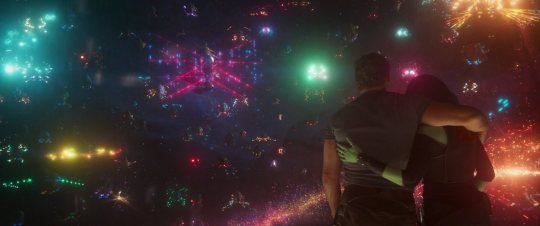
Does it pass the Bechdel Test?
Yes, six times.
How many female characters (with names and lines) are there?
Five (35.71% of cast).
How many male characters (with names and lines) are there?
Nine.
Positive Content Rating:
Three.
General Film Quality:
The pacing is a disaster, the story is weak, and if the style of comedy isn’t to your taste it can be very grating, but the central theme has at least some glimmers of genuine quality.
MORE INFO (and potential spoilers) UNDER THE CUT:
Passing the Bechdel:
Gamora passes with Ayesha. Nebula and Gamora conflict. Gamora asks Mantis about her empathic abilities. Gamora passes with Mantis. Gamora and Nebula fight. Gamora confronts Mantis.
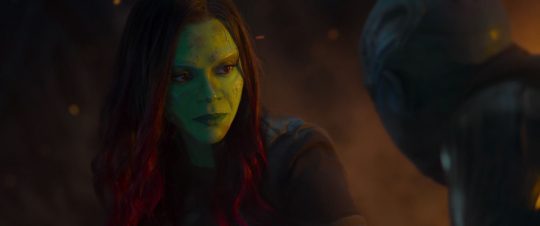
Female characters:
Meredith Quill.
Gamora.
Ayesha.
Nebula.
Mantis.
Male characters:
Ego.
Peter Quill.
Drax.
Rocket.
Groot.
Stakar Ogord.
Yondu Udonta.
Taserface.
Kraglin.
OTHER NOTES:
Nice of Ayesha to randomly exposition on the way her people are created, even though it is not relevant to the plot or anything else at all.
Gold Ben Browder is the highlight of this film. Because it’s Ben Browder. And he’s gold.
The immature escape-from-the-Sovereign-fleet bickering between Quill and Rocket (with chimes in from Drax) while Gamora is the Token Female and Wet Blanket is just...chafing a really tedious cliche.
Drax hanging out the back of the ship as they’re crashing is one of those things where the characters are so unrealistically indestructible it makes it hard to engage with the idea that they’re ever in real danger. That happens a lot in this movie.
Android prostitutes. Sigh.
Daddy issues. Never seen that done before. Thrilling.
First time I saw this movie I thought it was a weird choice to make the raccoon the main character of the B plot, but to be honest, Rocket is the best of the Guardian characters and front-lining him is one of the better choices of the film.

The whole idea that Quill was able to hold an Infinity Stone because he’s half god really fucks over the whole ‘the Guardians teamed up to withstand the power of the stone together’ thing. Like, nevermind, that whole climactic moment from the first film didn’t mean shit, Quill is a half-god.
Kraglin thinks that Nebula would be the type to buy a pretty necklace or a nice hat and this is just one of those weak, gender-stereotyped jokes that makes me annoyed at the lack of awareness in writing ALIEN CULTURES and also just, like, the basic ability to comprehend character personalities. I complained about this when I reviewed the first Guardians film, but honestly. Whether in throwaway lines or entire plot arcs, these movies are rife with gendered writing, more than any other films in the MCU so far, and that doesn’t make a lick of sense. ALIEN. CULTURES. GUYS.
He’s playing catch with his dad and MY GOD, glowy god power should not be this trite and boring.
This script has a bad habit of over-playing its jokes. You gotta know when to stop, y’all.
URRRGGH, the momentum of this movie straight-up dies every time the plot shifts back to Quill and his dull daddy issues. The imbalance between the A and B plots is staggering.
Gamora and Nebula’s conflict and eventual reconciliation is one of those few quality emotional beats in this movie; the recognition that the hate that has been engendered between them comes from the abuse they suffered at Thanos’ hands, and that they are both victims of him, not of one another. It’s a kind of insightfulness that is surprising, considering the cliches and under-developed arcs that populate the rest of the film.
Credit where it’s due for genuinely funny jokes that they don’t overplay: the Mary Poppins gag, Drax’s nipples, the giant Pac-Man.

Yondu deserved a better movie, man. I don’t know why the rest of this story is such a mess when the little slivers it gets right are so spot-on.
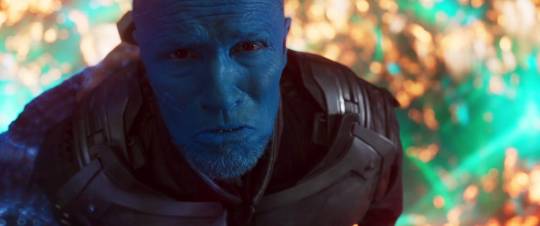
So, daddy issues. It’s one of the most overdone cliches in the history of storytelling, typically stemming from a very performative-masculine root (the father as the only/most important role model for his son, specifically in modelling manliness), and/or the old-fashioned patriarchal idea of the son as his father’s heir (and the idea that that makes the relationship between a father and son more profound than any other). Men love to write stories about their daddy issues, despite the fact that they’re rarely interesting or unusual or different to the billion other daddy issues stories that have already been told. As such, the fact that this movie is built around that same-old-same cliche is a fact distinctly to its detriment; that said, it’s also the one well from which it draws any spark of meaningful inspiration.
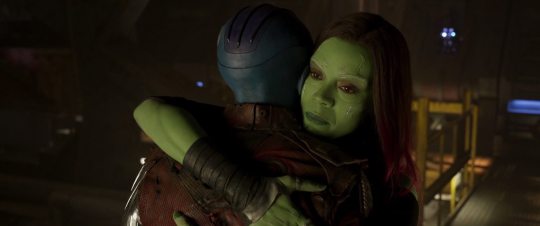
The dot points above have already made it clear to which sparks of inspiration I refer; the Daddy Issues threads with Gamora and Nebula and their abusive father Thanos, and Quill’s realisation of the way Yondu ended up filling the fatherhood role in his life. Gamora and Nebula’s Daddy Issues are automatically fresher than the average on account of them not being dudes (Ant-Man had the same thing going for it, though that movie made a much greater strength out of it); that said, the fact that Thanos’ terrible parenting forms the backbone of the two sisters’ conflict and eventual unification is not what makes that slice of the plot work: it’s the sibling bonding, not the Daddy Issues. The sibling bonding is where the fire’s really at (again, enriched by the fact that the characters are female; funny how the under-representation of women (or any group) in media can make even small amounts of representation seem impressive just for existing), but unfortunately, that bond is pared down to the absolute minimum number of scenes possible for functionality as a subplot, and therefore we never really get to enjoy what it offers so much as we kinda point and wave at it as it goes by. Yondu gets a bit more play, both through the character’s own ruminations on his life/personality/relationships while hanging in the B plot with Rocket, and through Quill’s Daddy Issues whining in the A plot to which Yondu’s relevance provides the only saving grace. Still, Yondu’s place in the plot and in Quill’s life only gains narrative weight in the final act, leading to a cathartic denouement for the character, but not for the film itself. The bloated emptiness of the A plot with Ego is something which Yondu’s meaningful sendoff cannot retroactively undo.
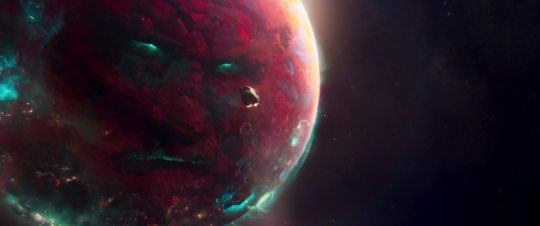
I’m...trying to figure out if I have anything nice to say at all regarding Ego and all that he entails, but I’m not coming up with anything. A godlike character who is also kinda-sorta a literal planet should not be so devoid of interesting factors, and yet, here we are. With every overdone boring Daddy Issues cliche in the book, played straight. We’ve got ‘I never knew my father!’ abandonment-resentment! We’ve got father-son bonding (heavy Americana edition)! We’ve got the heir-to-my-empire, follow-in-my-footsteps schtick! If it’s overdone and boring, we’ve got it! The fancy special effects visuals can’t make up for the total absence of compelling plot (the first movie in the franchise also made that mistake, though it at least faked it on the plot front a little better), and the shapelessness of the story on Ego prior to the reveal wreaks havoc on the pacing of the movie; where the B plot has trajectory from the jump, the A plot just kinda wanders around, having nothing new or interesting to do or say, nor even any thoughtful ways to bring itself around to that aforementioned reveal (as with the first film, things just kind of conveniently happen and characters go places and say things at the opportune times; nothing flows naturally from one event to the next, cause and effect style. I am baffled that people think James Gunn knows how to plot).
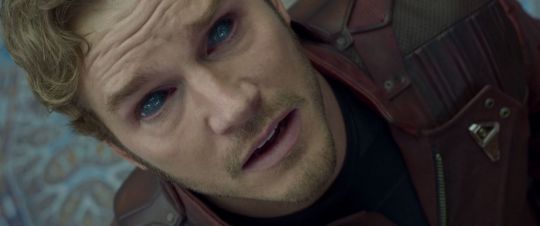
Speaking of characters going places and saying things, this film also does a very poor job of utilising its cast in a meaningful way, which makes it kinda embarrassing that it’s called Guardians of the Galaxy as if the whole team actually matters. Much like in the first film, Drax is just an extra without any real plot or purpose of his own, no narrative or character arc to speak of beyond being a total douche to the new female character on the block, Mantis (the fact that the movie uses Mantis as a punching bag and laughing stock for the so-called good guys is among its more tasteless sins). Groot, meanwhile, was already more of a gimmick than a character, but that’s up to eleven now, and like Drax he could pretty easily be excised from the story without lasting effect. Gamora’s interactions with Nebula are really her only good fodder; her tangential attachment to Quill is incidental and has no personal relevance for Gamora, she’s just providing someone for Quill to bounce his inane misogyny off, because how would we recognise him without it? Quill being the centre of this plot does at least make sense this time (sleeping pill that it is), unlike in the first film where he was frankly pointless to the story; nevertheless, the drudging Daddy Issues cliche of this movie fails to make anything insightful or impactful out of Quill’s experiences. As noted earlier, Rocket is, bizarrely, the only character who feels like his story matters, and it’s his and Yondu’s character exploration that wins the prize as the highlight of an overall weak, spectacle-laden film that thinks it’s much funnier than it really is.
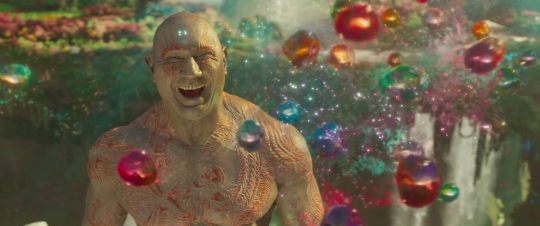
It’s no secret at this point that I don’t care for the Guardians franchise, but it isn’t complete absent glimmers of good promise and creative storytelling. Unfortunately, it’s also largely overrun with lazy plotting and vaguely-connected strings of shenanigans that prioritise rapidly-staling comedic beats over any semblance of narrative cohesion or character development. A rocking soundtrack and a smattering of toilet humour does not a worthy film make; it’s not like I’m going in looking for some high-brow drama, I just prefer my entertainment to hang together a little better than this does, and it surprises me a bit to hear people sing the praises of something so very, very messy. Whatever. It did its job for Marvel’s bottom line, so I don’t expect they’ll cook up any quality improvements for the third film of the franchise, when it comes. I sure would be glad to be wrong, though. There’s so much potential they’re wasting here.

#Guardians of the Galaxy Vol. 2#Marvel Cinematic Universe#MCU#Bechdel Test#female representation#Guardians of the Galaxy
3 notes
·
View notes
Text
The Book Ramblings of May
In place of book reviews, I will be writing these ‘book ramblings’. A lot of the texts I’ve been reading (or plan to read) in recent times are well-known classics, meaning I can’t really write book reviews as I’m used to. I’m reading books that either have already been read by everyone else (and so any attempt to give novel or insightful criticisms would be a tad pointless), or are so convoluted and odd that they defy being analysed as I would do a simpler text. These ramblings are pretty unorganised and hardly anything revolutionary, but I felt the need to write something review-related. I’ll upload a rambling compiling all my read books on a monthly basis.
[apologies for the delay with this one: I was binging Good Omens and contemplating spending 200 quid on a pair of shades to match Crowley’s sweet pair]
Falstaff - Robert Nye I’ll admit that I was ready to embrace this book as fucking great right from the word go, because it seemed so up my alley; Falstaff is a titan of the carnivalesque and one of my very favourite Shakespeare characters, and so from the very premise I figured that there was very little that could go wrong. The book takes the form of the memoirs of Sir John Falstolf (no, I don’t know about the ever-changing name spelling nonsense) told over the course of a hundred days, and becomes a journey through history told from the perspective of the fat drunk knight and interjected with lengthy insults to his cook or scribes and even lengthier songs of praise for his own cock or his innumerable sexual exploits. Everything about this is fucking great. In the course of the book you’re given incredibly evocative descriptions of carnivals or tavern debauchery, followed by hilarious anecdotes on fantastically crude subjects, and holding it all together is a narrative voice that can effectively handle both the grandiose reminiscing and the tales of shagging and farting. I also want to praise this book’s fantastic blending of the characters of Shakespeare and other popular fictions of the time with the characteristic Falstaff flare, including one fucking genius link between the character of Bardolph and the stories of the pig-faced woman Tannakin Skinker. Shakespeare’s characters probably are not that difficult to adapt, or at least not inasmuch as adapting the character traits that I perceive as responsible for making Shakespeare’s characters great - you’ll inevitably get some people arguing that Falstaff is Shakespeare’s greatest character because of his complexity, but for me the fact that he is a corpulent tanked-up knight bloated at the seams with sack and fabricated tales of grandeur is enough to make him a quality guy. The archetype is captured splendidly by Nye, but the book doesn’t half remind us of how fucking amazing Shakespearean dialogue is by comparison to Nye’s attempts at Falstaffian humour, and thereby highlights the difference between Shakespeare’s Falstaff and the basic character shape. The book delves into numerous specific events of I Henry IV (and a couple from 2 Henry IV), often quoting lines from Shakespeare’s play verbatim, much to the deficit of the rest of the text that has to string it all together with writing that obviously is not up to snuff with Shakespeare’s amazing writing. The dedication to the plays from which Falstaff was spawned seems at times odd, when a good few chapters are dedicated to extrapolating on one minor event in Part 1, which, to my understanding, was but one of the jests that Hal pulled on Falstaff, and but one of the instances that he was called out for his obvious bullshitting. If Falstaff was repeatedly made a fool of by Hal, he wouldn’t have directly addressed only one of said instances as if it was a big deal, but of course, it was a scene in the play and so it had to be adapted in this book. Whether this was down to Nye not having faith in his own ability to make up more pranks that Hal pulled on Falstaff, or simply because he knew that he had to write in this sequence because he needed a direct link to the play, is a question that I can’t really answer. But let’s talk about Falstaff’s bullshitting, and the complexities that arise from it. Falstaff’s whole shtick is that he is a mighty bullshitter, spinning yarns of heroic exploits and trying to talk his way out of trouble, and thus it stands to reason that his memoirs would reflect this, right? As I first went into the book, I was fully taken in by what I was reading, for although it was dumb, the story was centralised within a world of farce and Rabelaisian carnival, a world in which French armies can be defeated by drunken Englishmen brandishing hogsheads for weapons, men can eat enough food for seven men and still demand dessert, Irishmen will stab you up the arse from below while you sit on the bog, and every woman is inexplicably attracted to a fat drunken knight. It also mythologised Falstaff’s character, that he was conceived atop the knob of the Cerne Abbas giant and that his father died from laughing at nothing in particular. Is this not enough to make the story worthwhile? Would second-guessing Falstaff’s words at every turn, cross-referencing them with what we know of the truth from the Shakespeare plays, not only render the reading experience a pointless trudge, but demystify this world of carnivalesque absurdity? Falstaff’s overblown postulating on whether or not he is lying, or indeed his reasons for lying, are enough to satisfy me without contemplating the book from a meta perspective. There is also the character Scrope, who acts as one of Falstaff’s scribes and uses his position to call out Falstaff’s fabrications for us in a dramatic way, but a) there are discrepancies in his so-called truths and b) he’s a colossal dickhead, so regardless of Scrope’s presence in the story, we’re given the option to still side entirely with Falstaff and his comical version of reality. This is my perspective, but it is worth considering that I am a vacuous fool incapable of complex thought, so adopt my opinions with caution. I do, perhaps, have a few criticisms about Falstaff’s gratuitous descriptions of sexual escapades, not because I’m a prude who can’t stand the mention of the secrets of our own sinful bodies, nor even because it is unjustified in the narrative (because of course Falstaff is going to brag and give too much detail, if not for the sake of posterity than to make his servant scribes uneasy), but because I don’t feel that it fits the comedic tone of the text. Shagging is a staple of fabliaux and folksongs, but the comedy comes from who’s doing the shagging, or where they’re doing the shagging, or the extraneous circumstances surrounding the shagging. This book just describes shagging, which is funny when considering, as mentioned above, the fact that Falstaff within the story is including such titillating or sensational tidbits to vex his scribes (a strand which reaches its high point when Falstaff makes his amanuensis transcribe his words WHILE he is in the act of shagging), but taken as it is, it doesn’t seem in line with the rest of the book and its comedy. When this story has to plod on without its Falstaff-centric source material (or indeed, even from 2 Henry IV, in which Falstaff doesn’t really do a whole lot), it can get rather tedious as it becomes a mere listing of historical events and Falstaff’s minor parts in them, but at that point the book is rather winding down anyway, so perhaps I can’t complain too much. WOULD I RECOMMEND?: HELL YEAH, IF YOU’RE INTO SHAKESPEARE
The Hike - Drew Magary I picked this book up because I’d heard it compared to The Third Policeman in terms of it being a journey narrative, and I had a hankering for a book in which the story is not driven by the actions of the character, but rather the situation that they were thrown into, mainly because I’m interested in seeing how different authors go about doing this and not making the resulting narrative crap. Immediately upon going into this book, the acerbic narrative voice reminded me of John Dies at the End, and as the book continued and began to unveil other similarities, most egregiously the technique of using the bizarre weird reality-warping and monster-centric nonsense as a means of juxtaposing or disguising the book’s true content, that of the heinous DMC (that is, the deep meaningful conversation), I thought that I was in trouble. The reason why this is a book ramble, and not just a flat-out review, is that at this point I feel like I’m just rambling about the broad genre of contemporary American horror-centric weird fiction, and so to go through the book point-by-point may be a tad redundant when we already know exactly what to expect from the genre; a review would in all probability just devolve into quibbling about minor semantics. The story follows a man who, getting lost on a hike, stumbles into a world of nightmares and oddities, half of which were presumably inspired by the author’s obscure fears and the rest being absurd non-sequiturs to amp up the kookiness. It is nothing if not memorable, with its foul-mouthed crabs and murderous men wearing the faces of Rottweilers and whatnot. The book eventually develops to be smarter and more twisty-turny than such a randomly-selected clusterfuck of ideas might suggest, but these moments become transitory stops scattered amidst the rambling improvisational D&D campaign that is the main narrative. The story does have a habit of periodically bringing us to a formative experience in our protagonist’s life in the form of dream visions, with some interesting blurring between reality and fiction that doesn’t detract from the sheer fucking ludicrousness of the amount of shit that our protagonist has gone through, or at least the sensational self-reflective tone of these events’ retellings. This put me in mind of John Dies at the End, as did an ineffable sense of self-importance that the protagonist of this book seems to impart. I can’t properly word it, but there’s something to our protagonist’s narration, in that we see the world through his eyes but the retelling seems embellished somewhat to make him seem better off, and the fact that I noticed this at all speaks to me of shoddy characterisation. That’s not to say that the character is an unflappable badass the whole way through the story; it just seems like the character beats are cookie-cutter and that his moments of weakness or breakdown only occur because they have to, in order to make us feel sympathy for him. Both this book and John Dies at the End utilise new nomenclature on the fly for the horrors they find, but in all cases it just seems so pre-meditated, and the insistence on using these terms makes it seem like we ought to be on board with them as well, regardless of how stupid they are. Some of these terms are also tinged with an element of our narrator’s feelings of repulsion or standoffishness, in a manner similar to a downtrodden kid trying to stand up to a bully by referring to him with an insulting nickname. It’s all just rather tonally dissonant, the fact that we have to align with and appreciate our protagonist juxtaposed with the reality of our protagonist not really being that likeable. John Dies at the End (or at least its sequel) attempts to obfuscate the angst of its protagonist by admitting at the end to having a retrospective ghost writer, attributing the changes to the story and relatively inconsistent character fuckery to an unreliable narrator and details being altered in post, but this book lacks this safety net. What this book does have at the end is a bit of life-affirming reality-changing nonsense, and more importantly a fucking sweet twist at the end which, whilst not having much to do with the rest of the story (being dependent on memories and characters who didn’t have much to do with the overall narrative), leaves the story on a bittersweet note. In all my time spent reading classic literature, I’ve really missed experiencing twists that a) I didn’t already know about or wouldn’t have predicted, and b) actually have some fucking oomph. WOULD I RECOMMEND?: PROBABLY
A Connecticut Yankee in King Arthur’s Court - Mark Twain The question of authorial intent loomed over me as I begun reading this book. The introduction places the story firmly within the framework of Twain’s own righteous vengeance at the age he lived in, whereas I was under the impression that the book was naught but a dumb burlesque of middle English romances with some fun anachronisms thrown in for comedic effect. I thought that Twain’s ‘dream of being a knight errant in armour’ was funny as shit, but according to this introduction writer geezer Justin Kaplan (who apparently knows a better way of enjoying the book than myself), Twain’s dream ought to be interpreted as ‘a nightmare of being swaddled in iron, confined and helpless, just as Mark Twain was often to feel confined and helpless in his way of life’. As such, I sought advice from my friend, who told me to just go in with my unsophisticated cap on and I’ll be fine, and also took solace in Twain’s squib 1601, his exercise emulating my main man Rabelais in which famous Elizabethans hit the shit about shit and shagging, to adopt the mentality that Twain is just fucking about and that I don’t need to think too much about what I’m reading. Now I’ve sat through enough seminars of medieval literature to have heard every imaginable inane comment from every single vacuous shitwit grabbing at the lowest hanging fruit possible when it comes to pointing out the silliness of Arthurian romances; I’m a dab fucking hand, albeit unwillingly, at recognising all of this shit, and at suppressing my groans when slack-jawed fuckheads go over the same empty points about how middle English romances are ever so daft. “I mean, what’s up with all these knights running around attacking each other for no reason?!? That doesn’t make much sense!!” they all opine to each other, confident that they’re bringing something original and nuanced to the conversation, to jolly plaudits and insufferable guffaws. (No I’m not bitter about this, I have no idea what you’re talking about). Twain of course touches on all the usual points that you’d expect in a romance parody, but I needn’t have braced myself for an onslaught of unoriginality, as he does so with fantastic wit and evokes an actual comedic image rather than just commenting on the world’s lack of logic. He paints a delightful picture of naive and foolish knights howling with laughter at slapstick and ooo-ing and ah-ing at one another’s exaggerated tales, which is not only a great representation of Arthurian knights to explain their questionable behaviours, but justifies how they are so easily swayed and led by our protagonist Hank Morgan, the eponymous Yankee. I’m also a great fan as to how far they take the delusions of the Arthurian chaps to, believing with complete conviction that a swine pen is an ogre’s castle and that the pigs within are kidnapped noblewomen; there’s a lot of fun to be had with this, and as absurd as it seems, I’m glad that the explanation isn’t any more complex than it just being a result of everyone’s unyielding belief in everything. Our protagonist sets out to whip this century into something resembling nineteenth-century society, and putting aside the suspension of disbelief we must have in Hank’s apparent knowledge of every-fucking-thing imaginable required to accomplish this transformation (from building phone lines and electric fences to a ludicrously precise knowledge of the timing of eclipses), the story is a great romp of technology trumping magic and the grim realities of an unfair world, with some fantastic memorable scenes here and there. The plot somewhat meanders, the stories of Arthurian legend being rather directionless beyond the overarching call for adventure, and so we get a bit of that and we get a bit of blending in with peasant life, but overall the book is made up of a series of encounters and problems to overcome, which is fine to read for the most part (for some adventures are more fun than others). Though I want to pooh-pooh the idea that the story is a castigation or attack on the political structures and struggles of the time, and indeed can continue to pooh-pooh it so long as such content is if not subliminal than overshadowed by the story’s fun content, this unfortunately bubbles to the surface in an overt form when the book draws to a close, with a swift arrival of reality and sudden need for a bloody war. The mask of fun burlesque is stripped away to give us a galling look at a stubborn England, the denizens of which would rather die than change their faulty unfair ways. It’s not enough to tarnish the rest of the book, but it did leave a sour taste in my mouth, not because it’s an objectively bad thing but because scathing attacks of that calibre and of that level of overtness seemed to come rather out of left field. The transformation of the book from one thing to the next is dependent on a swift plot progression that occurs in a short period of time and is conveyed by a massive exposition dump which rushes through the last chapter of the Morte D’Arthur and plunges us into a fight between the Church and our protagonist, a fight that the story, apparently now being a treatise on the inability for people to change and our helplessness in altering the state of things, must regrettably end with our hero losing. But now I’m prattling on about an approach to the text that I was adamant I was not going to take. Don’t let it tarnish the rest of the book; that’s all still good shit. WOULD I RECOMMEND?: YEAH PROBABLY
Tales of the German Imagination (trans. by Peter Wortsman): - ‘The Singing Bone’, ‘Hansel and Gretel’, and ‘The Children of Hameln’ (the Brothers Grimm) - I struggle to place the Grimms fairy tales in terms of an analytical approach, and so it’ll suffice to say that these stories are exactly what you’d expect from the Grimms, in that they’re short and dark and make for easy reading - ‘Rune Mountain’ (Ludwig Tieck) - a proper romanticism story with a fantastic dream-like storytelling tone and incredibly evocative imagery throughout - ’St Cecelia or the Power of Music’ (Heinrich von Kleist) - a well-written actualisation of a cool suspenseful horror story concept with a few nice spooky bits, albeit with a rather slow middle and generally anticlimactic end - ‘Peter Schlemiel’ (Adelbert von Chamisso) - an amazing idea for a story that, while bogged down with unexplained magical objects straight out of Hoffmann’s fairy tales popping up every now and then to take the story in weird directions, and based on a social ostracisation that really does not seem like as big a deal as the story makes it out to be, is still very enjoyable - ’The Marble Statue’ (Josef von Eichendorff) - another story that brings to mind Hoffmann’s fairy tales (which I should perhaps instead just consider the archetype for German romanticism?), this time in terms of its romantic setting and soppy protagonist, and indeed its dumb allegorical dream-quest nonsense ending - ‘My Gmunden’ (Peter Altenberg) - so short that I didn’t really know what I was meant to be laughing at - ‘The Magic Egg’ and ‘A New Kind of Plaything’ (Mynona) - absolutely amazing little snippets of madness and laughter at oddity, the first story being an absurdist exercise in stupidity with a cast-aside veneer of meaning to the story, and the second being a jolly examination of a ludicrous idea - ’The Seamstress’ (Rainer Maria Rilke) - a compelling and vaguely unsettling story with fantastic character descriptions of the titular seamstress and an ending that casts our narrator adrift - ‘The Island of Eternal Life’ (Georg Kaiser) - a short and enjoyable story of rapid cartoon-like escalation, albeit with an ending more befitting a cynical satire on humanity - ‘In the Penal Colony’ (Franz Kafka) - a story I’ve read before and my favourite of Kafka’s writings; it’s dark and compelling (if a bit long-winded at point when describing the intricacies of the machine), and has a fantastic culmination (specifically the fate of the Officer) with elements of regret and serious fucking brutality - ‘The Blackbird’ (Robert Musil) - possesses a narrative voice that, while philosophical and high-minded, was not enough to embellish the story’s rather boring content (or at least seemed a tad misused when utilised to describe warfare) - ‘The Lunatic’ (Georg Heym) - over-the-top and gruesome and overall fucking hilarious; godspeed to ridiculously hyperbolic depictions of madmen in literature - ‘A Conversation Concerning Legs’ (Alfred Lichtenstein) - a conversation on one absurd subject, with dialogue that possesses all the necessary elements to make the humour work; it’s matter-of-fact and occasionally stupidly verbose to juxtapose the oddity of the subject matter, there’s rapid escalation from one train of thought to the next, and the conversation ends as abruptly and pointlessly as it had begun - ‘The Onion’ (Kurt Schwitters) - one of the first surrealist stories that I’ve read that has properly made me consider the ineffable and indescribable genius of the minds that concocted it, as well as having a pretty fucking sweet premise even before the text starts getting properly surreal and fragmented - ‘A Raw Recruit’ (Klabund) - a very funny story with a satirical premise I’m well used to - ‘The Time Saver’ (Ignaz Wrobel) - a story with an interesting abstract premise that is continuously built on in a manner that put me in mind of Krzhizhanovsky, but with an ending that didn’t seem very connected to the plot that preceded it (though perhaps that was somewhat the point) - ‘The Tattooed Portrait’ (Egon Erwin Kisch) - perhaps the funniest story in the collection, possessing the satire of people in power and absurd turns of fate to knock esteemed people down a peg as to be found in Gogol or my favourite Leskov short stories - ‘The Experiment or the Victory of the Children’ (Unica Zurn) - a story that takes the same general steps as Mynona’s ‘A New Kind of Plaything’, but seems less tongue-in-cheek and satirical and more like it’s trying to make some sort of grand statement - ’The Secrets of the Princess of Kagran’ (Ingeborg Bachmann) - purportedly a modern day fairy tale (albeit set in a mythologised past full of names for places and people I’m unfamiliar with), with the influence of modernism presumably being evident by the nonsense anticlimactic ending WOULD I RECOMMEND?: HELL YEAH
#book reviews#book ramblings#book rambles#the hike#drew magary#falstaff#robert nye#a connecticut yankee in king arthur's court#mark twain#i won't pretend that i don't still struggle to properly spell the word 'connecticut'#like that second 'c' shouldn't fucking be there#no but seriously everyone go and read that german imagination anthology#it's like my favourite anthology of this year#my yearly amazing anthology#for last year i had Calvino's Fantastic Tales#which was also great#i have in fact been doing other reading this week but it's all been non-fiction on areasof study that interest me#just an absolute shit load on bruegel the elder and netherlandish proverbs#it's in research for my essay on Labyrinth's goblins#an essay which is ten thousand words long at present and has spiralled into an idea for a story of which i've done six thousand words#busy busy
0 notes